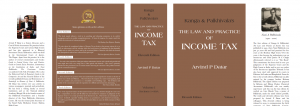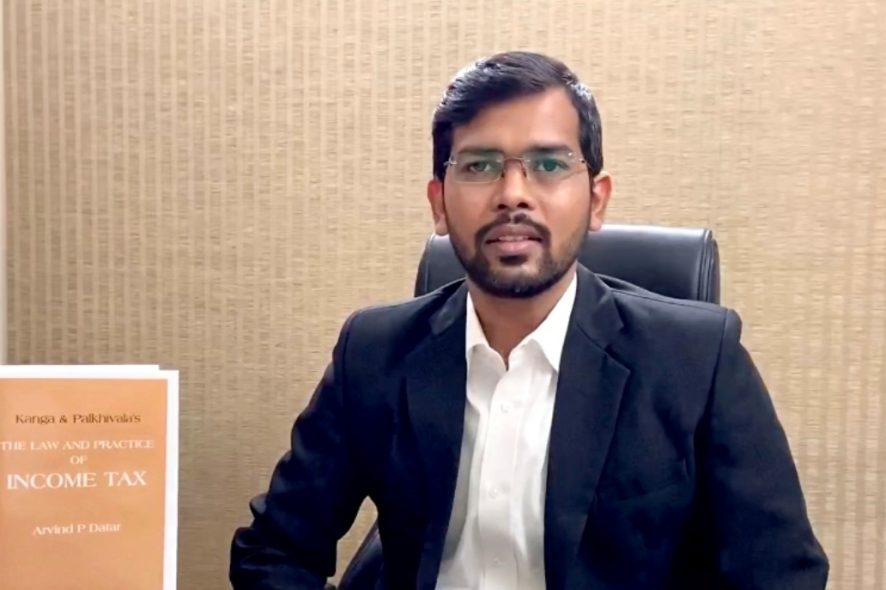Sandeep Bagmar R is a practicing Advocate at the Madras High Court and is specializing in Tax and Corporate Laws. He is the Partner and co-founder of DS Advocates, a law firm. Prior to the founding of DS Advocates, he was managing independent law practice under the name Kaar Vidhi – Tax lawyers and Consultants. He began his journey in the legal profession by joining the chambers of Mr. Arvind P Datar, Senior Advocate in 2010. With nearly a decade’s experience at the Bar, Mr. Bagmar has worked on most complex tax litigation’s and transaction advisory. He has assisted Mr. Datar in editing and revising the 10th and 11th edition of Kanga & Palkhivala’s The Law and Practice of Income Tax—a leading authority on Income-tax. He has also co-authored the Master Guide to Income-tax, 2014. Mr. Bagmar has penned over 50 articles on tax and corporate laws published in various journals, periodicals, and newspapers.
Mr. Bagmar regularly appears before the Madras High Court, Authority for Advance Ruling, Income Tax Appellate Tribunal, and National Company Law Tribunal. He has considerable experience in corporate tax, international tax, and transfer pricing. He is an alumnus of ILS Law College, Pune.
Mr. Sandeep Bagmar is interviewed by Mr. Ujjwal Jain, EBC-SCC Online Student Ambassador, and currently pursuing law from TNNLU and is presently in the 4th year of the course.
- Congratulations to Mr. Datar and your team on release of the revised (11th) Edition of Kanga & Palkhivala’s, The Law and Practice of Income Tax. This edition marks the birth centenary of its primary author, Nani A Palkhivala. The earlier edition (10th Ed.) was released in 2014 (after a gap of ten years) and this edition has come in 2020 after six years – Any reason behind it? If you could please list some of the Unique Selling Propositions (USPs) of the revised edition of the commentary?
The 10th edition was released in 2014 after a gap of ten years. There is no one reason which can be pointed at, there are multiple factors which go into writing a commentary and especially when one has to update and revise the work of Mr. Palkhivala.
Mr. Datar was entrusted with the task of editing the 10th Edition in 2007 and many professionals had assisted him. The 9th edition is a commentary which covered judgments reported upto volume 261 of the Income Tax Reports (ITRs). However, the revision of the 10th Edition was an arduous task as the team had to cover almost 100 volumes of ITRs by the end of 2013.
Revising and updating of a book has various facets to it, and for a subject like income-tax, it is even more tasking as you have yearly amendments, conflicting decisions on same issue from different courts and more over law for each of the assessment years is different, and with some instances having retrospective amendments. The task was even more onerous considering the fact that few of the decisions of the Higher Courts were upset by legislative amendments. Therefore, taking these factors into account it took numerous days of labour, time and dedication.
However, in contrast to the 10th edition, the work for the current edition was planned immediately after the release of the 10th edition. Mr. Datar and our team, including Mr. MV Swaroop and Mr. Mihir Nanidwadekar, divided the chapters of the book and updated the commentary at regular intervals. This ensured that the first drafts were readily available for Mr. Datar’s review and we were able to get the book published as planned in 2020 to celebrate the birth centenary of Mr. Palkhivala.
The current edition is available both in hard bound and e-book. Covering all important decisions reported upto 421 ITRs and including analysis of all the latest amendments made to the Income-tax Act by the Finance Act, 2020. The first chapter of the commentary is on interpretation which is a must read for all the law students. It traces the history of the Income-tax Act, constitutional scheme behind it, along with the important principles on interpretation of taxation laws. Understanding of these principles is significant for all the law students who are interested in taking up tax practice. Moreover, for busy practitioners and tax advisors the commentary of following chapters will be useful: General Anti Avoidance Rules (GAAR), Transfer Pricing, Equalisation Levy, revised commentary on reopening of assessments, TDS provisions, and non-resident taxation.
The electronic version of the book has many added advantages – it can be used both on computers as well as tablets. One can highlight, make annotations, share extracts of the commentary, print relevant portions, etc. The current edition also accompanies appendices in a pen drive, which includes the Income-tax Act, Rules, DTAAs, Circulars, Allied Acts and Rules, etc. For e-book customers, this content can be accessed from a microsite.
2. A book “dies a slow and natural death” if not revised. You have played an instrumental role in assisting on the 10th & 11th Edition of Kanga & Palkhivala’s – The Law and Practice of Income Tax – a book which is now in its 70th year of publication and continues to be the leading authority on the subject. How has the experience been? Did this help you professionally advancing in your career? If yes, how?

I began assisting Mr. Datar on the book as a law student. Initially I was asked to prepare case notes from the ITRs and as time progressed, Mr. Datar had trained the team well to prepare precise and perceptive case notes to be placed at the appropriate place for the revised commentary. Thereafter, I was also entrusted with the task of co-ordinating with the entire team and the publisher.
For the benefit of the readers, the process of updating any commentary is laborious. For their convenience, the process, in summary includes the following:
- Reading and understanding the statutory provisions, its amendments and legislative history for each of these amendments and understanding the existing commentary of a chapter
- Updating the changes made by legislative amendments to the commentary
- Filtering the judgments of a particular provision from ITRs and other tax journals
- Making precise notes for each of these judgments
- Placing these notes at relevant portion of the existing commentary
In todays’ modern technology, all these steps can be done easily over our personal computers. In our discussions and conversations with Mr. Datar regarding his previous publications, he always cherished and recalled how he updated his earlier editions of Central Excise, which was done manually on a typewriter where he had a special author copy which had printing only on left side and the right side was left blank for updating the next edition.
Moreover, assisting in revising a book like Kanga and Palkhivala’s is the most educative experience and may be superior to doing a master’s or a doctorate. It has a significant influence in your professional practice, the most important, being, enhancing your understanding and comprehending abilities thereby immensely helping one’s practice before the Courts. Mr. Datar has always advised and encouraged juniors to take up writing – he believes that ‘writing helps one to understand the entire scheme of the Act and the relevant subordinate legislation’s. As this in-depth understanding cannot be attained even if we prepare extensively for a case. Writing of a book has an added advantage as it helps in understanding the structure of a particular statute, enabling one to carefully study the statutory provisions and entire case laws on the subject. Furthermore, while writing the commentary one has to compare similar provisions in other enactments and oversee the development of the law over several years.’ It was his encouragement that motivated me to write a book on Income-Tax and soon after the 10th edition of Kanga and Palkhivala was published, I wrote “Master Guide to Income-tax”. This book was designed to provide concise and meaningful analysis of Income-Tax Act for experienced professionals and most importantly for beginners.
3. The taxation course, as a component of academics in various law schools & Universities, has been belittled to computation, consequence of which being, that the students develop a disinterest towards the subject in itself. The present state of affairs (in some & not in all law schools & Universities) is such that, tax exams tantamount to math problems and various rudimentary principles of interpretation are not stressed on. What goes downhill is the fact that taxation is an elective in some varsities and indirect tax laws do not find place in the curriculum.
In such an academic backdrop what would be your advise to a student who is interested in tax laws and wishes to take up internship(s) and further, a career in this field of law? If you could mention some resources (online and offline) for a beginner (or anyone who wishes to unlearn and relearn the course) so as to be productive during an internship in a tax practice office/firm or a tax practice team in a law office/firm?
Were you as a student (in your undergraduate days) steadfast and determined to pursue a career in the Income Tax law practice? How did you develop your interest in this (Income Tax) area of law and converted the same into a career opportunity?
I agree, most of the law schools do not give adequate importance to tax course. Historically, tax has been the domain of Chartered Accountants as they are the ones who file your tax returns and audit. That may be one of the primary reasons why tax was never made a compulsory subject in the curriculum. I guess there is a change in the trend now.
However, I disagree with your statement that ‘tax exams tantamount to math problems and various rudimentary principles of interpretation are not stressed on’. The fundamentals of tax laws, especially Income-tax, can be learnt well by solving mathematical problems, the principles of more than 300 sections of the Income-tax Act can be thought only by solving these problems with various scenarios and illustrations having different permutations and combinations. If one were to conduct only a theoretical class of this ever-expanding law, I’m sure no law student would be interested in taking up tax as a field of specialisation. In my opinion, the course needs dynamic illustrative learning along with focus on some of the key aspects of interpretation of tax laws. Another, suggestion would be to invite faculties from ICAI professional course to train law students in accounting course as well. Inclusion of verticals like international taxation / cross border taxation and transfer pricing as a part of specialisation in taxation law can also be considered, and the knowledge of the same could be garnered by inviting domain experts to give lectures on these verticals.
I gained my interest in this field because of my affinity towards accounts. I owe this to my account’s teacher Ms. N. Malathi, who taught us Book-Keeping at High school. A fair understanding of accounting practices is important for learning tax law. It makes the entire learning more fun and easier. This was the primary reason why opting for tax practice was an easier option.
For students who aspire to take up tax practice as a career opportunity, I would advise them to take up an accounting course at an early stage and get familiar with accounting practices. This is essential for a tax practice, as one must decipher the balance sheets, return of income, audit reports and multiple forms. For students who do not have accounting as a course in their law curriculum, they may take up a basic accounting course or do an internship with accounting firms. As this will give them the opportunity to learn tax as well as accounting. In their later years, they can take up internships with offices doing tax litigation at appellate authorities and Tribunals.
4. “A good senior can make all the difference to the career of a young lawyer.”(Sorabjee & Datar, Nani Palkhivala – Courtroom Genius)
If you could please narrate your experience in the Offices of Senior Counsel Shri Arvind Datar Sir? What would be your advice to students who wish to take up litigation as their career and finding the right mentor and a senior?
Yes! I completely agree with that.
My initial association with Mr. Datar was purely academic where I was attached to his chambers for writing the 10th Edition of Kanga and Palkhivala’s. He always encourages juniors to write on any topic and says that writing is the best way to learn. I was fortunate to lend my assistance in the 10th Edition and now the 11th Edition.
My initial years of practise in his chamber saw very limited exposure to litigation and court work. As I was assisting him on the book. In the later years, I assisted him in preparation of cases and opinions. Mr. Datar ensured that while preparing for a case, no page is unturned, he insisted on referring to all the leading commentaries on the issue and carry out complete research on the precedents from various journals. Ensuring a thorough preparation. The experience of working on an opinion with Mr. Datar is even more rewarding, his opinions are precise, and one has to work on both the sides of a coin to come out with the right conclusion.
I would only say that if one wishes to take up litigation, then she or he should find an office which does trial court work. This is important to learn drafting and the art of advocacy. This art is best learnt at trial courts. Apart from the above, writing is also crucial, and one should make it a habit of writing atleast one article every quarter. I say this because, writing exposes one to: read, think, express, communicate and opine. These five attributes are pillars of any profession and especially profession like law.
5. Does DS Advocates accepts application for internship(s)? If yes, then please do mention the mail address where students, who wish to intern at your firm, can send their application to?
Yes. We do accept internship applications from fourth- and fifth-year students. Interested candidates can send their application to office@dsadvocates.in
6. Your message to law students and young advocates.
Law students should work hard towards their academics and participate in various competitions such as debates, moots, essays, etc. Most importantly, reading books is widely neglected. Students tend to do more of their research on legal database, instead of taking up a commentary and understanding the first principles of a subject. This approach needs to change. Every aspiring lawyer should read these biographies: Roses in December – An Autobiography of Mr. MC Chagla; My Life – Law and other things – An Autobiography of Mr. MC Setalvad; The Rebel – A Biography of Mr. Ram Jethmalani; Before Memory Fades – An Autobiography of Mr. Fali S Nariman; and Nani Palkhivala – The Courtroom Genius. There is so much to learn from these legends.
Students and young advocates should remember—patience, hard work, and commitment. All this will pay up at the right time!




